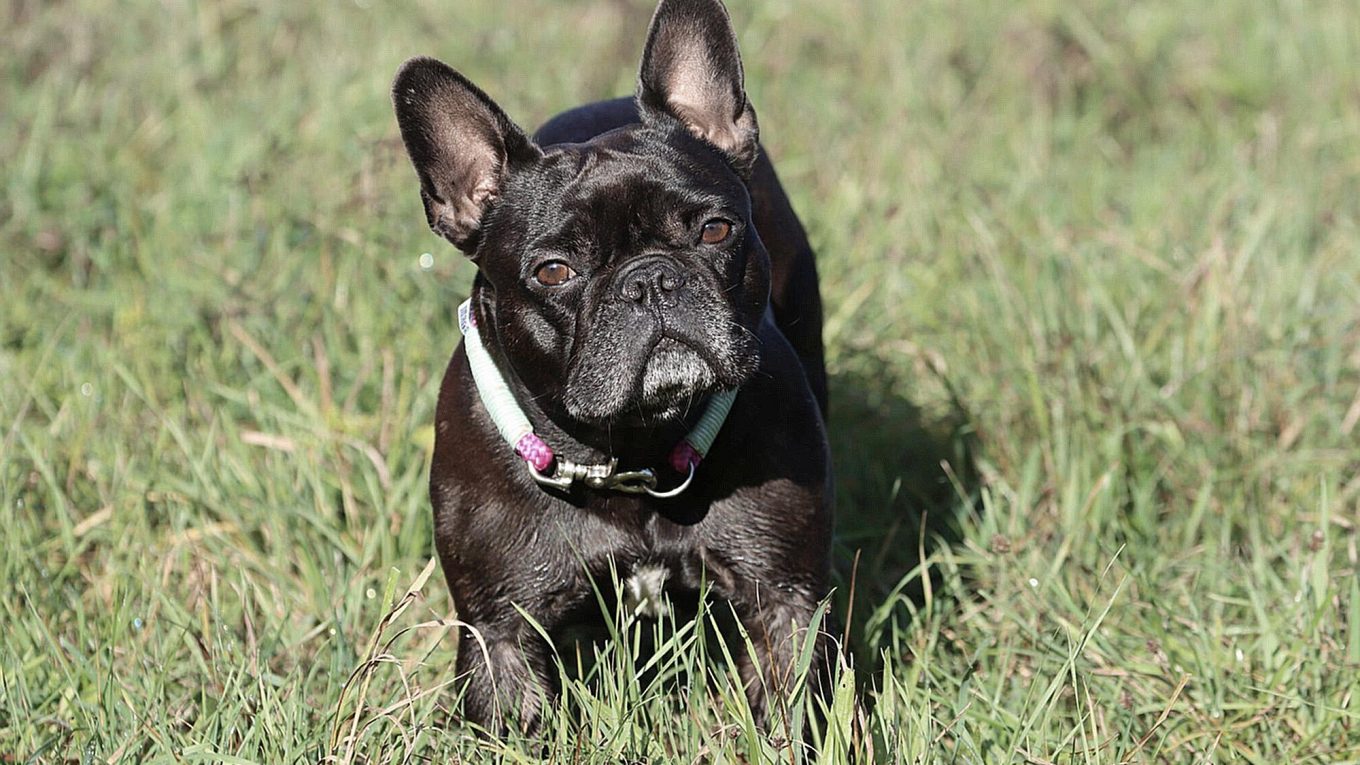Are French bulldogs disobedient?
French Bulldogs: they’re tiny, they’re adorable, and their personality can make your heart do a happy dance. But are they truly disobedient troublemakers, as some folks claim?
Well, get ready for a surprise. These little furballs have been unfairly labeled as stubborn and hard to train due to their mischievous and independent streak.
But let me tell you, as someone who knows a thing or two about our four-legged friends, it’s time to set the record straight. So buckle up and join me on this wild ride as we unravel the mysteries of French Bulldog behavior, explore what influences their obedience levels, and uncover the secrets to successfully training these lovable creatures.
Let’s dive in.
Understanding the Stubborn Nature of French Bulldogs
Contents
- 1 Understanding the Stubborn Nature of French Bulldogs
- 2 Training Your French Bulldog for Obedience
- 3 Establishing Yourself as the Pack Leader
- 4 Socializing Your French Bulldog Properly
- 5 Genetics, Upbringing, and Personality Traits Impacting Obedience
- 6 Positive Reinforcement Techniques for Obedience Training
- 7 Avoiding Harsh or Forceful Methods in Training
- 8 Benefits of Bonding Through Obedience Training
- 9 Conclusion
In this article, we’ll delve into the reasons behind their stubbornness and provide practical tips to help you navigate this endearing trait.
The Independent Streak:
French Bulldogs have an independent streak ingrained in their DNA. Originally bred as companion dogs, they learned to entertain themselves while their owners were occupied. This independence has been passed down through generations, making them less inclined to blindly follow commands.
Intelligence at Play:
Contrary to popular belief, French Bulldogs possess remarkable intelligence. This intelligence enables them to quickly learn and understand commands but also gives them the ability to question the relevance or necessity of a command before deciding whether or not to comply. They are selective about when they choose to obey.
Strong Will and Determination:
French Bulldogs are known for their strong will and determination. Once they set their minds on something, it can be challenging to change their course of action. Whether it’s resisting going in a certain direction during walks or refusing to engage in a particular activity, their determination shines through.
Tips for Managing Stubbornness:
- Patience and Consistency: Approach training with patience and consistency. Harsh or forceful methods will only lead to resistance. Instead, use positive reinforcement techniques such as treats or praise to motivate your French Bulldog.
- Socialization: Early socialization is key. Introduce your French Bulldog to various people, animals, and environments from a young age. This helps them develop better obedience skills and adaptability.
- Establish Leadership: Establish yourself as the pack leader and maintain consistent boundaries and rules. This will foster a sense of respect for authority and help your French Bulldog understand their place in the family hierarchy.
Training Your French Bulldog for Obedience
French Bulldogs may be small in size, but they have big personalities. They are known for their stubborn streak, which can sometimes make training a challenge. However, with the right approach and a little patience, you can turn your Frenchie into an obedient and well-behaved companion.
Establishing yourself as the pack leader is crucial when training a French Bulldog. Dogs are pack animals by nature, and they look to their leader for guidance and direction. By being confident, consistent, and assertive, you can establish yourself as the alpha and gain your Frenchie’s respect.
Positive reinforcement is the key to successful training with French Bulldogs. Reward-based training using treats, praise, and rewards will motivate your Frenchie to learn and obey commands. Remember to use high-value treats that your Frenchie finds irresistible to keep them engaged and focused during training sessions.
Basic obedience commands such as sit, stay, come, and heel should be taught from an early age. Use clear and consistent verbal cues along with hand signals to help your Frenchie understand what is expected of them. Practice these commands in different environments to ensure that your Frenchie can obey them regardless of distractions.
Socialization is an essential aspect of training a French Bulldog. Exposing them to various people, animals, and environments from a young age will help them develop good manners and become well-adjusted pets. Take your Frenchie on regular outings to parks, dog-friendly events, and meet-ups to ensure they are comfortable in different situations.
Consistency is key when training a French Bulldog. Establish a routine and enforce rules consistently to help them understand what is expected of them. Consistent repetition and regular training sessions will reinforce their obedience and help them retain what they have learned.
Patience is crucial during training sessions with French Bulldogs. They may take longer to grasp certain commands, but with time and patience, they will get there. Avoid using harsh punishments or yelling, as this can be counterproductive and may lead to fear or aggression in your Frenchie.
Consider enrolling in obedience classes or hiring a professional dog trainer if you need extra guidance. They can provide expertise, additional socialization opportunities, and personalized training plans tailored to your Frenchie’s specific needs.
Remember, every dog is unique, and what works for one may not work for another. Tailor your training approach to suit your French Bulldog’s individual personality and needs. With consistency, positive reinforcement, and patience, you can train your Frenchie to be a well-behaved and obedient companion.
Establishing Yourself as the Pack Leader

In this section, we’ll dive into the key steps and strategies to become the pack leader your French Bulldog needs.
Step 1: Consistency is Key
Dogs thrive on routine and structure, so establish clear boundaries and rules for your French Bulldog. Create a regular feeding schedule, designated playtimes, and consistent training sessions. This sets expectations and helps your pup understand who’s in charge.
Step 2: Exude Confidence and Assertiveness
Dogs are intuitive creatures, so maintain calm and assertive energy when interacting with your French Bulldog. Speak with a firm yet gentle tone, maintain good posture, and avoid displaying fear or anxiety. Remember, confidence is contagious.
Step 3: Set Fair and Consistent Rules
Your French Bulldog needs clear guidelines on what behaviors are acceptable. Establish rules that are fair and consistent, and reinforce them with praise or treats when your pup follows them. Positive reinforcement goes a long way in solidifying your position as the pack leader.
Step 4: Training Sessions for Mental Stimulation
Regular training sessions are essential for teaching basic obedience commands and strengthening the bond between you and your French Bulldog. Use positive reinforcement techniques such as treats, praise, and playtime to motivate your pup. Make it fun and engaging.
Step 5: Ongoing Effort and Dedication
Establishing yourself as the pack leader is an ongoing process that requires consistency and dedication. Stay committed to maintaining your role throughout your French Bulldog’s life to ensure continued obedience and respect.
Socializing Your French Bulldog Properly
Are you a proud owner of a French Bulldog? If so, you know that their friendly and sociable nature is one of their most endearing qualities. However, without proper socialization, French Bulldogs can develop disobedient or aggressive behaviors. In this article, we will explore the key aspects of successful socialization for French Bulldogs, providing you with insights and tips to ensure your furry friend becomes a well-adjusted and obedient companion.
Start Early:
Like humans, puppies have a critical socialization period between 3 to 14 weeks of age. During this time, they are most receptive to new experiences and learning. It is important to expose your French Bulldog puppy to various people, animals, and environments to help them develop confidence and adaptability.
Introduce to Different People:
To ensure your French Bulldog becomes comfortable around different types of people, it’s essential to introduce them to men, women, children, and individuals with different ethnicities or appearances. Encourage gentle interactions and positive associations by offering treats or praise when they approach new people calmly.
Socialize with Other Dogs:
French Bulldogs are social animals and benefit greatly from interactions with other dogs. Arrange playdates with well-behaved and vaccinated dogs in a controlled environment. Observe their interactions closely to ensure they are positive and not overly aggressive or fearful. If any issues arise, consult a professional dog trainer or behaviorist for guidance.
Expose to Various Environments:
To prevent fear or anxiety-related behaviors, expose your French Bulldog to various environments and situations. Take them on walks in different neighborhoods, visit parks, cafes, or pet-friendly stores. Gradually increase the level of exposure while ensuring their comfort and safety.
Training Classes:
Training classes or obedience courses can significantly aid in socializing your French Bulldog. These classes not only teach basic obedience commands but also provide opportunities for structured socialization with other dogs and humans under the guidance of professional trainers.
Consistency is Key:
Consistency is crucial when it comes to socializing your French Bulldog. Set aside dedicated time every day for socialization exercises and make it a part of their routine. Reinforce positive behaviors with rewards such as treats, praise, or playtime.
Respect Individual Temperament:
It’s important to respect your French Bulldog’s individual temperament and limits. Not all dogs have the same level of sociability, and forcing them into uncomfortable situations can lead to stress or aggression. Pay attention to their body language and signs of discomfort, and adjust the socialization process accordingly.
Genetics, Upbringing, and Personality Traits Impacting Obedience
French Bulldogs are known for their unique personalities and charm. However, their obedience levels can vary based on genetics, upbringing, and individual personality traits. In this article, we will explore how these factors influence the obedience levels of French Bulldogs and provide valuable insights to help you navigate this exciting journey with your furry companion.
Genetics:
Just like humans, dogs inherit certain genetic traits that can affect their behavior and temperament. Some French Bulldogs may have a genetic predisposition towards independence or stubbornness, which can make them less inclined to obey commands.
Conversely, others may possess genetic traits that make them more obedient and responsive to training. Understanding your dog’s genetic background can help you tailor your training methods accordingly.
Upbringing and Training:
The way a French Bulldog is raised and trained from an early age significantly impacts their obedience levels. Proper socialization is crucial to ensure they feel comfortable around other animals and people.
Positive reinforcement training methods, such as rewarding desired behaviors with treats or praise, are effective in teaching French Bulldogs to follow commands. Consistency in training methods and setting clear boundaries are also essential in fostering obedience.
Personality Traits:
French Bulldogs, like all dogs, have unique personalities shaped by a combination of genetics and experiences. Some may naturally have a more compliant and eager-to-please nature, making them more inclined to be obedient without much effort.
Others may possess a more independent or strong-willed personality, requiring additional training and guidance to develop obedience skills. Understanding your dog’s individual personality traits will help you tailor your training approach to suit their specific needs.
Positive Reinforcement Techniques for Obedience Training
French Bulldogs are renowned for their playful nature and lovable personalities. However, ensuring their obedience can be a challenging task. But fear not. With the right positive reinforcement techniques, you can train your French Bulldog to be a well-behaved companion. Let’s dive into the world of positive reinforcement techniques for obedience training.
Treats as Motivators:
- Find treats that make your French Bulldog’s tail wag with excitement. Experiment with different flavors and textures to discover their favorite.
- Use small, bite-sized treats that can be quickly consumed during training sessions.
- Keep a stash of treats handy to reward desired behaviors promptly.

Timing is Everything:
- Offer the treat immediately after your French Bulldog exhibits the desired behavior.
- This helps them associate the reward with the specific action, reinforcing the behavior.
- For example, if you’re teaching your French Bulldog to “sit,” reward them with a treat as soon as they sit down.
Consistency is Key:
- Reward your French Bulldog every time they demonstrate the desired behavior, especially during the initial stages of training.
- This reinforces the behavior and helps them understand what is expected of them.
- Gradually reduce the frequency of treats as your dog becomes more proficient but continue occasional reinforcement to maintain learned behaviors.
Verbal Praise and Physical Affection:
- Dogs thrive on positive attention from their owners.
- Use enthusiastic and upbeat tones when praising your French Bulldog, such as saying “good boy/girl” or giving them a pat on the head.
- Verbal praise and physical affection reinforce their obedience and strengthen the bond between you and your furry friend.
Short and Fun Training Sessions:
- French Bulldogs have short attention spans, so keep training sessions brief to prevent boredom or frustration.
- Aim for multiple short sessions throughout the day rather than one long session.
- Make training sessions fun and engaging by incorporating games and interactive activities.
Remember, positive reinforcement techniques create a more enjoyable training experience for both you and your French Bulldog. Be patient, consistent, and always keep the sessions fun. With time and effort, your French Bulldog will become a well-behaved and obedient companion.
Avoiding Harsh or Forceful Methods in Training
Training a French Bulldog can be a rewarding experience for both you and your furry friend. However, it is crucial to approach training with care and avoid using harsh or forceful methods. In this blog post, we will explore why it is important to train your French Bulldog using positive reinforcement techniques, and how you can create a positive and effective training environment for your beloved pet.
The Negative Effects of Harsh Methods:
Using harsh or forceful methods such as yelling, physical punishment, or intimidation can have detrimental effects on your French Bulldog’s behavior and well-being. These methods can lead to fear, anxiety, and even aggression in your dog. Instead of building trust and a strong bond, harsh techniques can create a negative association with training and lead to long-term behavioral issues.
The Power of Positive Reinforcement:
Positive reinforcement training is highly recommended for French Bulldogs. This method involves rewarding desired behaviors with treats, praise, or playtime to encourage your dog to repeat those behaviors. By focusing on positive experiences, you create a safe and secure training environment that fosters learning and enhances the bond between you and your furry friend.
Tips for Effective Training:
- Be patient and consistent: French Bulldogs, like any other breed, require time to grasp new commands. Keep training sessions short and frequent, focusing on one command at a time. Remember that consistency and repetition are key in helping your dog understand what is expected of them.
- Create a positive training environment: Eliminate distractions during training sessions and provide clear cues for your French Bulldog. Use simple verbal commands and hand signals consistently to help them understand what you want them to do.
- Make it fun: Incorporate interactive games into your training sessions to keep your French Bulldog engaged and motivated. This not only makes the experience enjoyable for them but also reinforces positive behavior.
- Seek professional help if needed: If you’re struggling with training your French Bulldog, don’t hesitate to seek professional help from a qualified dog trainer who specializes in positive reinforcement techniques. They can offer personalized advice, guidance, and hands-on assistance to ensure effective and humane training methods.
By avoiding harsh or forceful methods and embracing positive reinforcement techniques, you can unlock the best in your French Bulldog. Remember to be patient, consistent, and create a positive training environment. With time and dedication, you’ll have a well-behaved and happy furry companion by your side.
Benefits of Bonding Through Obedience Training
There’s no denying that French Bulldogs are some of the most lovable and adorable companions out there. But did you know that obedience training can take your bond with your Frenchie to new heights? In this article, we will explore the numerous benefits of obedience training and how it can help build a strong and harmonious relationship between you and your furry friend.
Benefits of Bonding Through Obedience Training:
Trust and Understanding:
Obedience training provides an excellent opportunity for you and your French Bulldog to spend quality time together. Through consistent training sessions, you develop a mutual understanding of each other’s expectations and boundaries, fostering trust and deepening your connection.
Safety First:
Teaching your Frenchie basic commands like “sit,” “stay,” and “come” not only makes them well-behaved but also enhances their safety. By obeying these commands, your furry friend can avoid dangerous situations or prevent themselves from getting lost, ensuring their well-being.
Behavioral Harmony:
One of the significant benefits of obedience training is preventing behavioral issues. By establishing a routine and enforcing rules, your French Bulldog learns how to behave appropriately in different situations, minimizing destructive behaviors, excessive barking, aggression, and separation anxiety.
Mental Stimulation:
Engaging your Frenchie’s mind through obedience training keeps them mentally sharp and prevents boredom. This mental stimulation is especially crucial for high-energy dogs like French Bulldogs, as it tires them out, resulting in a calmer and more relaxed demeanor.
Teamwork Makes the Dream Work:
Obedience training fosters a sense of teamwork between you and your French Bulldog. As you work together to achieve training goals, your furry friend learns to rely on your guidance and trusts your leadership. This positive dynamic strengthens your bond, creating a partnership where both parties feel understood, respected, and valued.
Confidence Boost:
As your Frenchie masters new commands and receives praise or rewards for their efforts, their confidence soars. This increased confidence extends to other areas of their life, making them more adaptable to new environments, people, and experiences.
Building a Foundation:
Obedience training lays the foundation for advanced training or specialized activities like agility or therapy work. By mastering basic commands and developing good listening skills, your French Bulldog becomes more receptive to further training and excels in various activities. Celebrating these accomplishments together strengthens your bond as you work towards common goals.
Em5WE9QFfa0″ >
Conclusion
In conclusion, it is a common misconception that French bulldogs are disobedient. However, this couldn’t be further from the truth. These adorable little dogs may have a stubborn streak, but with proper training and consistent guidance, they can be just as well-behaved as any other breed.
French bulldogs are known for their intelligence and eagerness to please their owners. They may not always obey commands immediately, but this is not because they are inherently disobedient. Rather, it can be attributed to their independent nature and strong will.
It is important to approach training French bulldogs with patience and positive reinforcement. Harsh discipline or punishment will only lead to resistance and defiance. Instead, focus on building a strong bond with your Frenchie through rewards, praise, and consistency.




